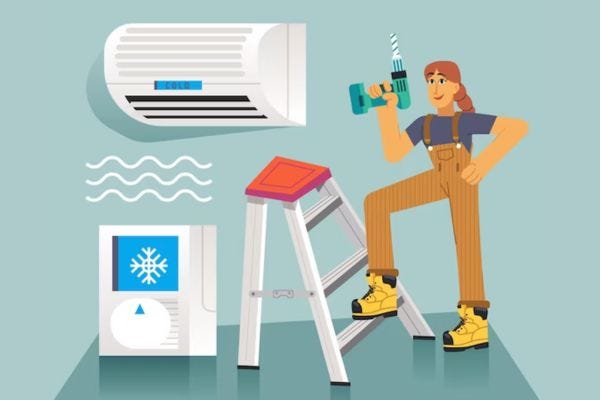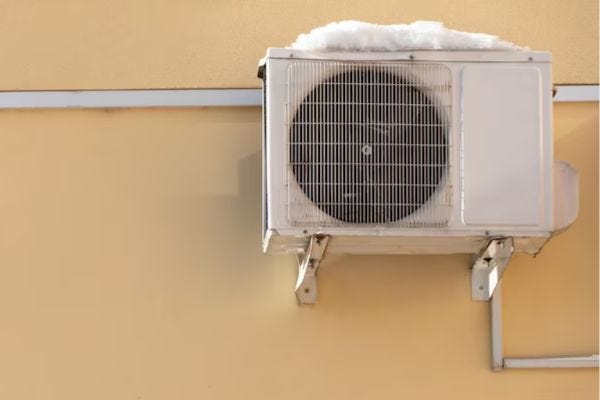Learn When it's Time to Replace Your AC!


A well-functioning air conditioner (AC) is a much-needed appliance during the scorching summer season. It ensures the comfort and efficiency of the family members. But like all machines, an AC unit doesn't last forever. After a certain time, it needs to be replaced.
However, AC shows some symptoms that indicate it is a replacement time for the unit.
If you notice a decline in cooling performance, rising energy bills, frequent breakdowns, or an aging unit, it's wise to consider a new AC. Decision-making might be difficult for you.
So here we go to explore the details of AC replacement.
Common Indications of an Aging Air Conditioning Unit (Signs of Decline)


Every device shows some trace of its declining performance. AC aging is a common reason for malfunctioning and low efficiency. The performance of the air conditioner unit declines and creates many discomforts with time.
You may not identify all those clues and may hesitate whether you need to repair or replace your air conditioner.
So, here are some common signs that your AC unit is aging and may need to be replaced:
Reduced cooling performance: If your AC unit is not cooling your home as effectively as it used to, you may assign it as a sign of replacement.
Refrigerant Leaks: Some people misunderstand that cooling leakage is normal for air conditioners. But, the air conditioner is developed not to leak any coolant. It happens when there is any puncture in the refrigerant lines or damage to the coil.
So when you find multiple leakages, a frozen evaporator coil, and a hissing sound from your air conditioner, it might be an indication to replace the unit.
Increased noise: An aged AC unit usually makes more noise than usual.
Frequent repairs: When an AC unit breaks down more often than before, you may identify it as a clue of replacement time. Frequent breakdown is a clear hint of your AC replacement.
Low Efficiency and Higher Energy Bills: Air conditioner conditions becomes bad with time. You may notice a sudden increase in your energy bills, even though your usage has not changed. It is a potential sign of old and bad AC functioning. The cooling efficiency of your air conditioning unit has declined massively, so it takes more power to operate.
Uneven cooling: Suddenly you may notice your AC is not cooling all rooms equally. This is a clear indication of bad performance and declining ability.
Air Conditioner Air Quality: The air conditioner air quality becomes poor with increasing age. Sometimes expired AC units emit strange odors. When you smell something like that, back-calculate its operating hours and age to gaze at its replacement time.
Visible wear and tear: Air conditioner condition is a matter of consideration to replace the unit. An old and faulty AC unit's exterior shows signs of wear and tear, such as rust or dents.
Old age: AC aging is a continuous process. The air conditioner unit age is not unlimited. Energy specialists and standards suggest replacing an AC unit over 10 years. You should seriously consider the replacement when it is over 15 years old. The lifespan of most cooling devices is on average 15 years.
What Should You Consider to Select AC Unit During the Replacement
Selecting a perfect AC unit is crucial as it is an investment for the next ten years. So knowledge about the criteria and different AC factors helps to select a suitable one. No worries, we accumulated all the considerations needed to select the best AC for you.
Here are some factors to consider when selecting a new AC unit:
Newer Models: Technology is an evolving thing and improves every day. So considering the latest AC model is important. Newer AC models offer several advantages over older ones. They are more energy-efficient, quieter, and have more features. They have higher SEER (Seasonal Energy Efficiency Ratio) ratings, which means they use less energy to cool your home. This can save your utility bills.
Upgrading to a new, eco-friendly AC model positively impacts the environment. These models often use refrigerants with lower global warming potential (GWP). By investing in an up-to-date AC model, you can enjoy energy savings, comfort, and peace of mind with reliability and efficiency.
AC Capacity: The size of the cooling unit is vital. Make sure the AC unit is the right size for your home. A unit that is too small will not be able to cool your home effectively, while a unit that is too large will consume more energy.
If you don’t know how to calculate, visit any house of butterfly. Our customer support team will give you a big hand to calculate the capacity.
AC Type: AC type selection is essential because different types have unique features and benefits. Here's why AC types matter:
AC types for different climates-Some AC types are better for specific climates for example central AC units or heat pumps are effective for hot and humid regions. In drier climates, evaporative coolers may be suitable.
Home Layout and AC- The layout of your home influences the type of AC you need. Central AC systems are ideal for multi-story homes, while ductless mini-splits are better for homes without existing ductwork.
AC types for different Room Spaces- Different AC types require varying amounts of space. Window units are compact and easy to install but are not powerful for larger rooms. Central AC units require outdoor space for the condenser unit, while ductless mini-splits have smaller outdoor units.
Installation Compexities- Some AC types are more complex to install than others. Central AC systems require professional installation, while window units can be DIY projects. Ductless mini-splits require some technical expertise for proper installation.
Noise Level of ACs-Consider the noise level of different AC types. Central AC units have outdoor units that can be noisy, while ductless mini-splits have quieter outdoor units. Window units tend to be noisier compared to other types.
Cost of different AC models- AC types vary in cost, influenced by factors like cooling capacity, efficiency, and installation complexity. Central AC systems are typically more expensive, while window units are more affordable. Ductless mini-splits offer a mid-range option.
Cost-effectiveness can save you cash. So, compare the prices of different AC units before making a decision. Remember the most expensive one is not always the best one.
User-friendliness of AC- Some AC types, like multi-zone systems, allow for zoning, which means you can control the temperature in different rooms independently. This feature is useful in homes with rooms with varying cooling needs.
Features: Present AC models have many upgraded features for the users. Consider suitable features such as a programmable thermostat, remote control, and variable speed fan. It will make you enjoy the cooling unit.
Warranty: Warranty of electronic appliances is important. Because it may malfunction at any time. An air conditioner unit with a long warranty will give you peace of mind. You will remain protected in case of any malfunction and breakdown.
AC Efficiency: An efficient AC unit can save costs over its lifespan. It ensures long-term cost savings with its better functioning and efficient operation.
Brand: A brand is a brand. A reputed brand means good technical conditions for their state-of-the-art fine finishing products. Research on different AC brands to see which ones have the best reputation for quality and customer service.
Professional Installation: Hazard-free use depends on the correct installation. Hire a qualified HVAC technician to install your new AC unit. This will ensure that the unit is installed correctly and operates efficiently.
Regular Maintenance: When installation is completed. Perform regular maintenance for your AC unit to keep it running smoothly and efficiently. It will extend the life of your unit and save you money in the long run.
FAQ:
Following are some FAQs on AC.
1. How long is the AC Repair time?
ans: The ac repair time may vary depending on issues and damages in it. General repairs like capacitor replacement or fan motor change need a few hours. A full unit repair may take 3 to 5 days.
2. How many years is an AC good for?
ans: Air conditioner users should be concerned about the lifespan of the AC. Otherwise, an unwelcome surprise in the summer is waiting for you.
However, a properly maintained AC can last 15-20 years.
3. Is it OK to run AC all the time?
ans: As a machine, it may run all the time. But continuous use may strain your unit and increase energy consumption.
4. How many hours should AC run per day?
ans: The general answer is 12-16 hours on average. But some factors need to be considered such as the ambient temperature and AC temperature setting.
5. Should I replace my AC before it dies?
ans: Yes, replacing the old AC unit can save you money and give you pleasant cooling. So replacing it before death is a wise decision.
6. How long do AC coils last?
ans: AC coils last for 10-15 years.
Conclusion
An old AC unit may release harmful refrigerants, potentially impacting health and the environment. So, regular assessment of AC conditions is crucial to maintaining a comfortable and safe home. It helps to know the time to replace it if needed. Timely replacement of an aging AC unit offers many benefits. You can enhance your comfort, save money on energy bills, and ensure a healthier living environment by changing it at the right time. Investing in a newer AC model improves comfort and contributes to a greener future. Newer models use eco-friendly refrigerants with lower global warming potential, reducing their impact on climate change.
So replacing an air conditioner on time is always a wise decision.

